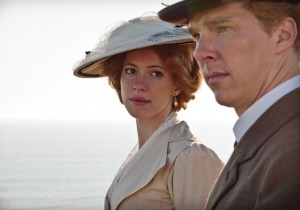 Those starved for early 20th century English period drama following the season’s end of “Downton Abbey” should prepare for the lavish buffet of riches provided by the miniseries treatment of Ford Madox Ford’s “Parade’s End” (HBO, 9 p.m.).
Those starved for early 20th century English period drama following the season’s end of “Downton Abbey” should prepare for the lavish buffet of riches provided by the miniseries treatment of Ford Madox Ford’s “Parade’s End” (HBO, 9 p.m.).
As your HD set glistens with the delights of the countryside, the opulent houses and the exacting set decoration, another tale of love and loss at the start of a world’s war will engage and delight with a bit more substance than the sometimes flitty upstairs/downstairs stories from “Masterpiece.”
It is a “Masterpiece” star, Benedict Cumberbatch of “Sherlock,” who stars in the work, making its bow on HBO tonight. Yet, in blonde hair and a deep mumble that makes much of what he says at first indecipherable he may be the least of the cast.
That may be that he’s playing his character so well: Christopher Tietjens is meant to be sort of a disappointment, by others and by himself. A numbers man caught in a marriage, who can’t break out of his stuffy English morals to do what’s right.
Much more vivid impressions are given by Rebecca Hall, stunning in a way that captures audiences just as it captured the hapless Tietjens. We are helpless against her considerable charms, her haughty look, and how dismissive and expressive her voice can be. She cheats on her husband to be noticed, or to avoid boredom or other pains in her life.
And aside from being cuckholded, there is a light in his life in the form of a young suffragette played with equal brilliance by Adelaide Clemens. To a backdrop of war and social change, Ford’s is a vivid and substantial treatment of the era, given an equally vast canvas by director Susanna White.
And while it may not be as quick-cutting as, say, “Downton,” it has a droll humor and sly sense of dialog and scene setting from no less a dramatic master than playwright Tom Stoppard.
Normally, the co-British production would be presented over five, one hour installments that may be a better way to take it in (though admittedly most of the first hour is given to adjustments to the stately pace and the initially impenetrable dialects). Yet it gets an oddly clumped presentation by HBO, with two hours tonight, another two Wednesday and winding the whole thing up Thursday.
It’s strange enough that it doesn’t get the usual Saturday night showcase send-off HBO gives its original films; to be presented all at once in the middle of the week seems to give in to those (and there are many) who would dismiss it as tedious and legubrious (these are the same people who think “Scandal” is a decent TV drama).
No, “Parade’s End” is the kind of high style mini-series that few make any more, even for public television. And its pleasures continue to unfold in its settings and costumes, a consistent strong storyline and a parade of delightful characters and actors including Janet McTeer, Miranda Richardson, Rupert Everett and Stephen Graham, known so well as Al Capone on “Boardwalk Empire” it’s tough to take his more literary-minded character seriously at first.
“Parade’s End” was derived by Ford as a series of novels, compounding the effort of Stoppard to turn it into a teleplay.
“It’s actually four books,” he said when I asked him about it during press tour last month. “It’s, you know, 800 or 900 pages. And it’s not a straightforward, linear novel. It’s actually quite tricky to work out the structure of it. It’s not a book which falls into five parts of equal length, by any means, so I could detain you well into the night to tell you what the problems and possible solutions were, but all I want to say about that was it was, indeed, quite difficult. But it was just the happiest job I’ve had for years. I just loved the job. I loved the book. I loved working on it. I felt I got lucky with the people who finally came on board to do it.”
“It’s a huge and epic piece of television, I think, that’s very ambitious in its scale,” White, who previously directed “Generation Kill,” said. “It’s taking what is probably the most important series of novels about the First World War that were revolutionary in their form, that came out just after James Joyce’s ‘Ulysses,’ and was an important modernist piece of fiction and looks at the huge seismic shift in society that the First World War represented.”
“The thing about ‘Parade’s End,’ and indeed, about the entire war, because unlike the Second World War, it was not a cut-and-dry good-and-evil picture,” Stoppard said. “It’s a tragedy in which all sides were culpable. The point about ‘Parade’s End’ and Ford Madox Ford and the fact that we’re talking about him as a modernist is that he saw the moral ambiguity in everything.”
“Parade’s End” begins tonight at 9 on HBO and continues Wednesday and Thursday at 9 p.m.